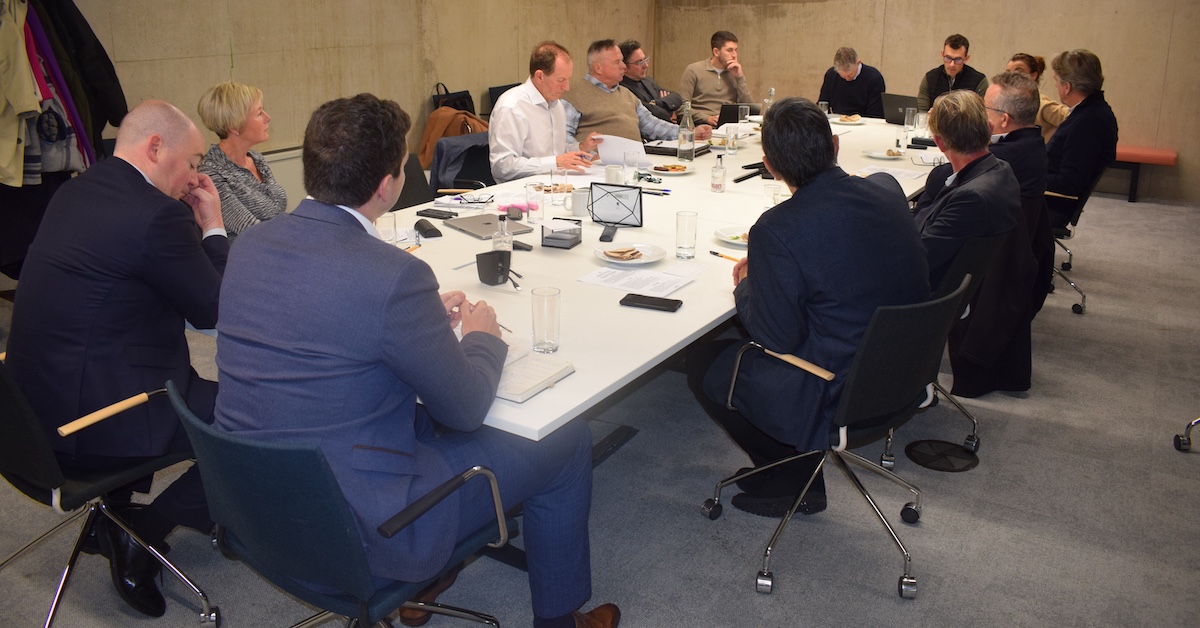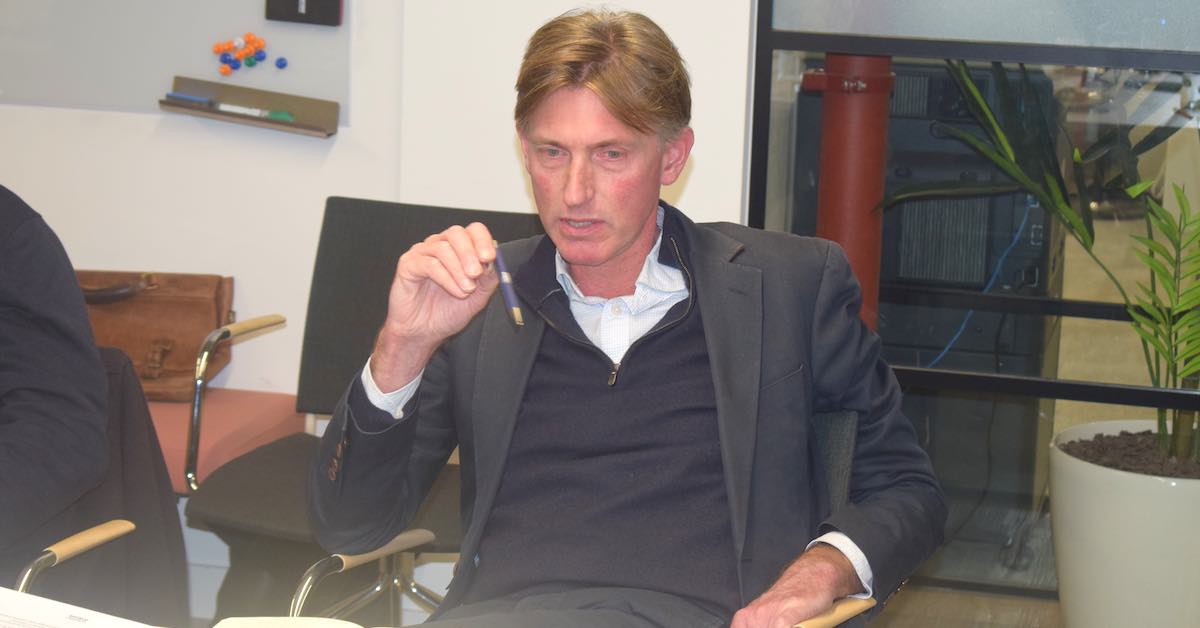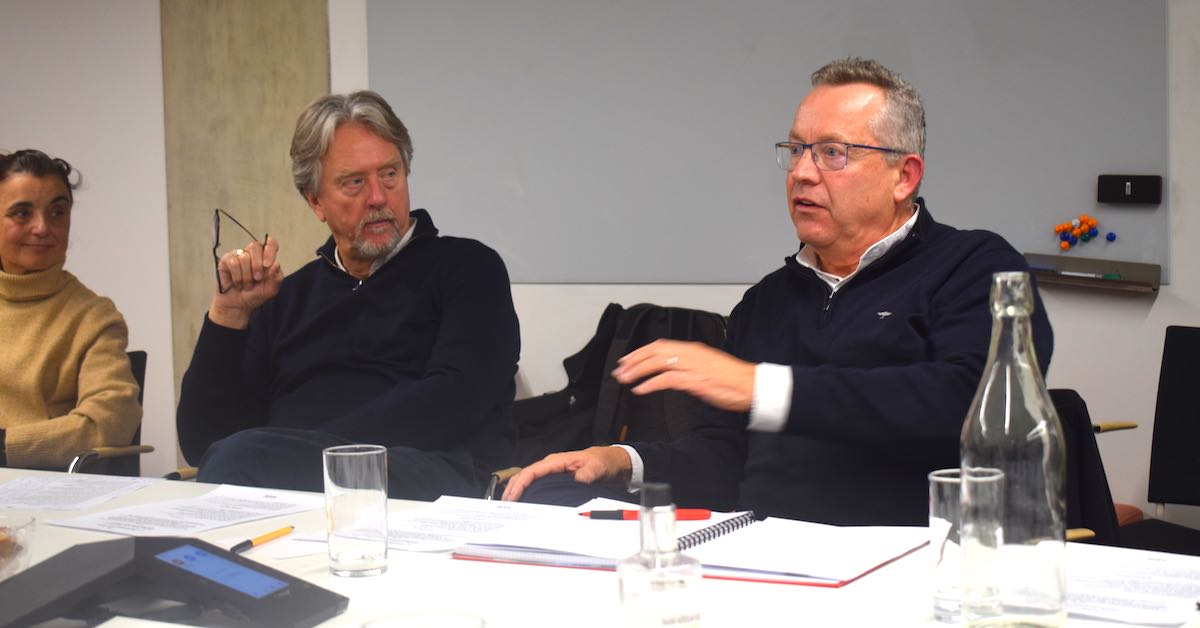Ahead of next year’s OxProp Summit in March, UK Property Forums teamed up with Sladen Estates (developer of Bicester Arc), Oxford Science Enterprise and the University of Oxford for a round table discussion, chaired by UKPF managing director Matthew Battle, on how to foster the growth of unicorn businesses (privately-owned start-ups worth $1 billion).
The body created to fund scientific start-ups in Oxfordshire has transformed the market for knowledge-based companies across the county, delegates heard at a UKPF innovation round table discussion.
The debate, on November 19 at the offices of Oxford Science Enterprises (which is focussed on how the city could produce more unicorns – privately-owned start-ups worth $1 billion). See panel line up in photo caption at bottom of page.
Chas Bountra, pro-vice chancellor of innovation for the University of Oxford, said it had already been shown that the university can create unicorns but what is now needed is a proliferation of firms valued at up to £100B.
He said: “That’s when we really have a massive impact, we change people’s lives, we change the planet and importantly, we create thousands of jobs, and therefore tax revenue, to get this country out of the mess we’re in.
“I think that’s got to be our ambition. I’m not worried about unicorns now, I’m more worried about creating the next Astra Zeneca and GSK or whatever.”
He said he envies Stanford University which has six companies on its doorstep, each worth more than $1 trillion.
Funding in the UK has proved difficult and Mr Bountra believes Oxford spin-outs may currently do well to move to the US where more risk capital is available.
He added: “But I’m hoping in two to three decades’ time the ecosystem here will be so exciting they will be wanting to stay here.”
Andrew Hopkins CBE founded Exscientia AI, an Oxford based unicorn, and has recently founded a new biotech firm called XYME
He described how, when Exscientia AI went public, there was almost no interest from UK investors. Suitable laboratory space was also hard to come by.
He added: “There just isn’t the capital or the appetite for creating major high risk tech companies in the UK.”
But he argued that talent, ideas and the ecosystem created in Oxford in the past 10 years had been incredible, thanks in large part to OSE.
“Now we’re in a completely different space,” he said. “You’ve got now an incredibly nurturing environment, With what’s been invested in creating the new real estate product that’s coming online, you’ve never been in a better place for starting a company quickly.”
He added: “The best way to create jobs is creating these companies. Companies employ hundreds of people, many of them with six-figure salaries. The tax bill that goes back into the economy is very significant.”
Pete Wilder, head of property and operations for OSE, said creating companies that solve the world’s biggest problems brings value. OSE is actively hunting unicorns, he said.
“I don’t think it’s realistic that all of these companies are going to float on the London Stock Exchange. But our shareholders are going to be driving for maximum value, which at this point probably means lots of focus on the US and other locations.”
Vaccitech, which later invented the Oxford vaccine, had looked to go to the US before OSE helped the firm find space in the Schrodinger Building at The Oxford Science Park, a rare find when supply was low.
Mr Wilder went on: “Fast forward to now and we’ve got two million sq ft in the pipeline. The whole look and feel of it has changed significantly. On top of that we recognise there is a lot to be done to support early stage companies in terms of the basics.”
Mr Bountra pointed to funding from OSE as key to enabling growth of firms in Oxfordshire, along with the national infrastructures at Harwell and Culham.
“I think, frankly, OSE has been transformative for our ecosystems since they were set up in 2015.
“Prior to that we were doing maybe four companies a year. As soon as we set up OSE, it was more than 20 and a couple of years ago we did 31.
“The important thing is it’s not just that they brought money into the ecosystem, it is that we now have, in the university, a number of academics who are serial entrepreneurs.
“They’re on their third or fourth company, so now what’s happening is that many students, many researchers and many faculties are looking at these individuals and saying ‘well if they can do it, I can do it’.”
This in turn, he said, had helped bring about clusters, such as in life sciences, space and satellite, AI and quantum computing, motor sport, autonomous vehicles, energy and publishing.
He went on: “There are not many places on the planet that have got so many clusters. If we can build on that, we can bring into our ecosystem even more investors – OSE have helped us bring in 300 investors.”
He wants more female entrepreneurs and more involvement with the local community.
“What I don’t want to happen in this area is what’s happened in San Francisco with all the problems around homelessness and crime etc, so we need to bring the community along with us instead.”
He sees the next big step change as helping to make the Ellison Institute of Technology’s development at The Oxford Science Park, a success.
He added: “If we do that, I guarantee more billionaires will come into the ecosystem.”
Placi Espejo, who leads innovation and economy for the Oxford-Cambridge Partnership, pointed out Cambridge is number one in the global innovation index of technology clusters while Oxford is number four.
“How come we are not one or two?” she asked.
Rachel Wood, managing director of Bicester Arc developer Sladen Estates, described the current funding market for development as ‘completely flat’.
“Somehow we’ve got to unlock that and, hopefully with the Government announcing this new super pension facility fund, it may actually mean that they can start putting money into projects, which ordinarily wouldn’t have gone into these things before.”
However, she said planning remains a major obstacle.
Addressing Mr Bountra, she said: “We’ve got to be more fleet of foot in terms of, if companies want to expand, we can’t have planning taking years and when you’ve got these growing companies they need to grow quickly.
“So how do you actually get that accommodation to grow those companies? It’s fantastic what you’re doing, so my question is what are your barriers to actually being able to achieve what you’re wanting to achieve?”
Chas Bountra said the challenges are well known but Oxford has much to celebrate. He added: “I realise Government doesn’t have loads of money and what money they do have, they’re going to spread it thinly across the country, and there’s nothing we can do about that.
“But I think what we can do is to use our brand and networks our alumni our talent to come up with really big ideas.”
He said billionaires worldwide are looking to leave a legacy by investing in great ideas and great teams.
Robin Rogers, director of economy & place for Oxfordshire County Council, said it is essential that the range of jobs created extends to the wider community and that the local infrastructure is capable of supporting people.
He said: “Part of the reason people come here is because we’ve got fantastic private schools and that’s great. But part of the reason people come here needs to be because we’ve got fantastic state schools that educate people who work in those businesses.
“The health service needs to work, the roads need to work and the trains need to work.”
Charles Butters, strategic property advisor to the council (pictured above), said a ‘powerful and compelling’ alliance exists in Oxfordshire which supports infrastructure improvements.
But he compared the experience of arriving on a platform at Oxford railway station and jetting into Oxford Airport.
“You want to feel that Oxford is global, thinks of itself as global and delivers an experience and infrastructure of a place that is taking itself seriously within that context.”
The need for infrastructure and support struck a chord with Mr Hopkins. He said employers need to be flexible to support staff including supporting their ability to travel. He wants staff back to the office to foster innovation.
But he said: “Oxford, for someone who lives in Abingdon, has almost built a wall around itself. It’s impossible to get into the city sometimes and it’s impossible to park.
“And yet we realise that most of my staff don’t live in a 15 minute city, they actually live across Oxfordshire and they have to commute.”
He added: “The reason why I think transportation is so important is also equality. Many staff need to do the school pick up and the current transport systems are not suitable.
“We often assume the average commuter is a lone individual, often a man, who works 9-5, gets a bus or a train into the city and leaves at a certain time. It doesn’t take into account the real flexibility people need.
“So we can’t empower our workforce on the one hand and have these very strict reductions on freedom on then other, so I think there’s an interesting argument that the city goes in one direction and the county goes in another and the whole economy is completely integrated.
“We can’t think about how we’re going to support all these new developments and what we’re going to do with the Debenhams building without thinking about how people are going to get there and work.
“Once you start employing people, they have a full life journey with you, they get married, buy a house and have kids etc. We need to understand how that journey is going to take place.
“What you don’t want to be doing is getting rid of your workforce or making it unattractive for them once they get to 30.”
Peter McLintock, real estate partner at Mills & Reeve, said more ‘non-resident’ venture capital is needed to help support Oxfordshire’s clusters of expertise. Currently 53 per cent of unicorn investment is going to Cambridge while only five per cent goes to Oxford.
He said: “Somehow our communication channels are not operating as they could be. I think that the Oxfordshire story is one of the things that may well be the bridge that gets us more into the spotlight.”
Chris White, managing director of White Commercial (pictured below), said Oxford tends to be inward looking and did not reach out to the county market towns enough.
He argued that the north of the county attracted too little interest from outside.
He said: “I’ve met a number of you before but there are an awful lot of you here who I think are very important individuals but I’ve never seen come to North Oxfordshire.
“I have a partnership with the LEP and they love dealing with me because I’m the only person that they deal with outside Oxford.
“I meet with them at Heyford Park quite regularly to talk about inward investment into the district and so my take is we’re very lucky in Oxfordshire and when I’m acting for companies looking outside of Oxfordshire, life is tough in terms of the commercial world.
“We’re lucky because we are relatively wealthy and we’ve got Oxford but I think that it’s Oxford and Oxfordshire that we should be looking at.”
Richard Venables, senior director for CBRE, sees a city centre market taking off in the next 10 years but he said train travel will become essential because some firms won’t find accommodation inside the city and will have to move further out.
He went on: “I think the train is absolutely essential to our growth going forward because there’s no way we’re going to build 300,000 houses in the next five years.
“But we can we can get 14 million people within an hour of Oxford on East West Rail and the Cowley branch line.”
Andy Nixon, partner, south east offices, for Knight Frank, wanted to bring the focus back to unicorns, arguing that a key factor for start-ups is the cost of rent.
He said: “I think as a collective we need to be looking at rents because the last thing you wanted to create all this amazing stock, when the only reason it’s viable from a development point of view, is the fact they are having to charge certain amount in rent to achieve it.
“So I think we don’t want to be forcing start-ups and small businesses to be going elsewhere because of that viability.”
He accepted that opportunities exist elsewhere in the county but he added: “From an Oxford point of view I think that something, particularly for the smaller businesses, that needs to be looked at.
“To try to encourage as much as possible of the promotion of lower rents for space is something, as an agent, I really struggle saying!”
Mr Rogers explained efforts at OCC in which the council is seeking closer ties with developers.
He said: “We are seeking to convene a new relationship with developers through a new developers’ forum that were convening.
“Some of you will have been involved in some of the discussions about that. It is a place where we can really come together about what the issues are which we need to pick off and do things together.
“We are seeking to get together as place champions across sectors so that we are having these conversations.”
Sarah Haywood, managing director of Advanced Oxford, explained how research had shown less than a fifth of Oxford’s science and tech companies which had raised investment, were spin-outs from the university.
She said: “We identified around 665 science and technology companies which raised private capital investment in last decade to support their growth.
“Under 20 per cent of those were Oxford University spin outs. These are companies that have heritage in all sorts of different forms but they still have the same challenges in raising investment
“And they choose to go to different places but they still have the same challenges of raising investment, attracting talent, getting their people to work etc.
“So I think we need to be really conscious that sometimes, if we overly focus on what is happening in the University of Oxford, we miss a very significant part of the economic activity of the whole of our economy.”
In summing up, Rachel Wood said there is fantastic work going on in the county but she wants to see the benefits.
She said: “It’s about trying to make sure that the whole of the UK benefits and that there are jobs.
“But it’s, as these companies grow, that they stay here and that the growth stays here and that the country gets the benefit of these companies as opposed to the companies maybe going elsewhere.”
Image:
The panel (l-r):
Matthew Battle, managing director, UK Property Forums – chair
Pete Wilder (at back), head of property & operations, Oxford Science Enterprises
Placi Espejo (at front), lead: Innovation & economy, Oxford Cambridge Partnership
Andrew Hopkins, founder, XYME
Peter McLintock, partner, Mills & Reeve
Hugh Blaza, consultant, UK Property Forums
Charles Butters, strategic property advisor, Oxfordshire County Council
Richard Venables, senior director, CBRE
Rachel Wood, managing director, Sladen Estates (developer of Bicester Arc)
Chris White, managing director, White Commercial
Chas Bountra, pro vice-chancellor of innovation, University of Oxford
Ollie Sargent, senior PR consultant, Cartwright Communications
Not in picture:
Andy Nixon, partner (South East & Greater London), Knight Frank
Robin Rogers, director of economy & place, Oxfordshire County Council
Sarah Hayward, managing director, Advanced Oxford
© Thames Tap (powered by ukpropertyforums.com).
Sign up to receive our weekly free journal, The Forum here.
















wooooooooooow